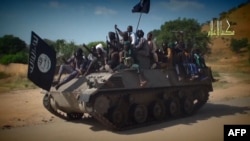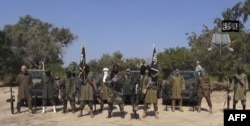A twin bombing in Nigeria's northeastern city of Maiduguri on Tuesday showed the continued ability of militant group Boko Haram to attack at will.
But even after a five-year insurgency, much else about the group - including its strength, the territory it controls and its relation to the Islamic State group - remains unclear.
To stop Boko Haram, Nigeria’s government has declared a state of emergency, deployed the military and even tried to negotiate with the group. But Boko Haram’s ability to overrun towns and carry out destructive bombings seems unchecked, while many aspects of the group’s operations and motives remain a mystery.
On Tuesday, twin suicide bombings killed more than 30 people in Maiduguri, the capital of Borno state, one of three states placed under emergency rule by the government last year.
Group's videos
What little is known about Boko Haram often comes from the group itself, in the form of videos released to the media. The latest one, released this month, shows villagers cheering fighters in a town that’s apparently been taken over by the militants.
It ends with a reference to Abu Bakr al-Baghdadi, the leader of the Islamic State group, which has seized territory in Iraq and Syria and declared a caliphate.
Boko Haram’s leader Abubakar Shekau has expressed a similar desire for a caliphate. But Bawa Abdullahi Wase, a security analyst and executive associate at the Nigeria-based Network for Justice, says that’s just rhetoric.
The number of people within Boko Haram fighting for religious reasons is few, he says. Rather, the group represents a motley coalition of criminals, violent political agitators and people fighting for the sake of money. He says for them, religion is just a cover.
“If you say you are a Muslim and you want to create a caliphate, and you are killing fellow Muslims, than who are you creating the caliphate for? Are you bringing people from the moon to come and settle there? So that is to tell you the religious connotations are only being mentioned there, to achieve certain mechanizations,” he says.
Ryan Cummings, chief Africa analyst at red24, a South Africa-based crisis management firm, says it’s difficult to get a grasp of how much territory Boko Haram controls, and what’s happening in territories they rule. The group and Nigeria's military have traded control of some towns repeatedly, and few independent observers have been able to enter territory the group has captured.
“Complications in terms of access of these areas to journalists and also, you know, the provision of information by an obviously biased Nigerian government has also skewed the exact circumstances that are prevailing in the northeast,” Cummings says.
Expanding flight
The group has recently carried out bombings in the northeastern states of Bauchi and Yobe, hitting civilian targets like schools and markets. Cummings says that could be a sign that it’s looking to expand its fight.
“It could be a suggestion that Boko Haram are seeking to firstly highlight their operational presence within these areas and possibly seek to extend the insurgency outside Adamawa, Yobe and Borno to these areas. I think that is a trend that one cannot discount,” Cummings says.
The group has also expanded northward, attacking the town of Damasak near the border with Niger on Monday, forcing people to head across the border for safety.





